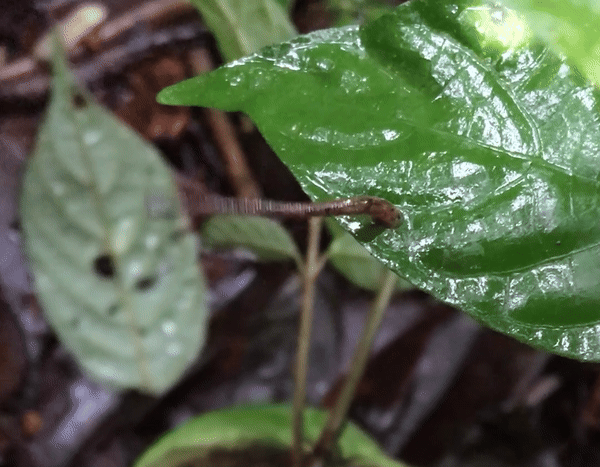New Research
Jupiter's Signature Red Spot May Have Evolved More Than Once
The planet's massive storm, known as the Great Red Spot, seems to be different from a spot first observed at roughly the same location in the 17th century, a new study finds
These Stunning Butterflies Flew 2,600 Miles Across the Atlantic Ocean Without Stopping
Researchers combined several lines of evidence to solve the mystery of why a group of painted ladies, which do not live in South America, were found fluttering on a beach in French Guiana
Easter Island Did Not Collapse From Overuse of Resources After All, Study Suggests
A new paper contradicts the idea that people used up the island's resources and experienced a significant population decline, instead proposing that a small society lived there sustainably
Chimpanzees May Self-Medicate With Plants, Using the Forest as a Pharmacy
New research suggests sick chimps seek out and eat plants with antibacterial and anti-inflammatory properties—a finding that could advance drug discovery for humans
Move Over, Genghis Khan. Many Other Men Left Huge Genetic Legacies
A 2015 study showed that ten other men have a lot of descendants. The paper is just one of several genetic studies revealing the secrets of descent
Why Are Some People Seemingly Immune to Covid-19? Scientists May Now Have an Answer
Researchers tracked the immune responses of 16 people intentionally exposed to SARS-CoV-2 and pinpointed a gene that seems to help resist the virus before it can take hold
Watch Blood-Sucking Leeches Leap From Leaves and Soar Through the Air
New videos may help settle scientists' long-standing debate over whether leeches can jump
Ancient DNA Illuminates the History of Malaria, One of the World's Deadliest Diseases
Researchers extracted parasitic DNA from preserved teeth and bones, revealing how malaria spread across the globe in a new study
A Giant Interstellar Cloud May Have Once Enveloped Earth, Potentially Causing Ice Ages
Astronomers suggest this cold, dense cloud compressed our sun's protective field between two and three million years ago, leaving the Earth exposed to cosmic material
Ernest Shackleton's Last Ship, Quest, Discovered Off the Coast of Canada
The famed explorer died of a heart attack aboard the ship near South Georgia Island in 1922, and it sank in the north Atlantic Ocean in 1962
Scientists Release Largest Trove of Data on How Space Travel Affects the Human Body
A collection of 44 new studies, largely based on a short-duration tourist trip in 2021, provides insight into the health effects of traveling to space
African Elephants May Call Each Other by Name
In a new study, a computer model was able to identify the recipient of an elephant's call more than a quarter of the time, which scientists say is significantly greater than chance
Astronomers Discover Water Frost on Mars' Tallest Volcanoes
On early winter mornings, a thin layer of ice forms in craters atop the Red Planet's towering peaks, near its equator, according to a new study
When Did Humans Domesticate Horses? Scientists Find Modern Lineage Has Origins 4,200 Years Ago
A new study suggests people in the Eurasian steppe bred horses around 2200 B.C.E., challenging earlier ideas about the beginnings of horse husbandry
Ancient Celtic Elites Inherited Wealth From Their Mothers' Sides
A genetic analysis of opulent burial mounds in Germany sheds new light on how power passed through family lines
This Giant Cosmic 'Butterfly' Is a Planet-Forming Disk
New research has confirmed that the celestial object may be the biggest of its kind ever found
Archaeologists Discover Clues to Ancient Migration Route That Brought Humans to Australia
New research offers evidence that humans did not inhabit the island of Timor until around 44,000 years ago, suggesting it was not part of the original migration route from Southeast Asia to Australia
England's Mysterious 'Seahenge' Monument May Have Been Built to Prolong Summer
One researcher thinks the structure was used for ancient rituals during a period of bitter cold
130-Foot Snake Carving Slithers Through 2,000-Year-Old Rock Art Found in South America
The conspicuous reptile renderings spotted along the Orinoco River likely functioned as territorial markers, akin to pre-Colombian road signs
Paleontologists Uncover Rare Skull of 500-Pound 'Thunder Bird' in Australia
The most complete skull of the extinct, flightless bird ever found has revealed adaptations that might have made the creature well-adapted for a life near water
Page 3 of 247
:focal(827x543:828x544)/https://tf-cmsv2-smithsonianmag-media.s3.amazonaws.com/filer_public/30/00/3000c3d2-1519-4375-a014-bcc8b5d5fed1/pia21985orig.jpg)
:focal(2117x1250:2118x1251)/https://tf-cmsv2-smithsonianmag-media.s3.amazonaws.com/filer_public/b0/c3/b0c341da-9979-4fef-8ae7-1865608d7fe4/una_mariposa_cardera_a_punto_de_emprender_el_vuelo_autor_roger_vila.jpg)
:focal(600x451:601x452)/https://tf-cmsv2-smithsonianmag-media.s3.amazonaws.com/filer_public/11/c0/11c0aa00-61be-490d-ad84-510b08bb0be0/davis-rock-garden-1200x900.jpg)
:focal(2568x1712:2569x1713)/https://tf-cmsv2-smithsonianmag-media.s3.amazonaws.com/filer_public/0d/00/0d00e8c6-566a-4abc-8a18-1b04d9ef5e3b/gettyimages-200207474-001.jpg)
/https://tf-cmsv2-smithsonianmag-media.s3.amazonaws.com/filer/32/07/3207d76b-cc96-4797-bd16-d0a7b42cf5e3/khan_42-18214555.jpg)
:focal(1061x707:1062x708)/https://tf-cmsv2-smithsonianmag-media.s3.amazonaws.com/filer_public/d9/cb/d9cb64a2-b2f5-4169-8c96-077273fab5f2/gettyimages-1287184953.jpg)

:focal(900x591:901x592)/https://tf-cmsv2-smithsonianmag-media.s3.amazonaws.com/filer_public/af/14/af149306-1031-40f2-ba28-4eb6b489df62/anopheles-arabiensis.png)
:focal(537x445:538x446)/https://tf-cmsv2-smithsonianmag-media.s3.amazonaws.com/filer_public/e8/b6/e8b68174-1c9b-465e-8469-b66151dd09fa/heliosphere.jpg)
:focal(1250x964:1251x965)/https://tf-cmsv2-smithsonianmag-media.s3.amazonaws.com/filer_public/9f/cb/9fcbea71-bd47-4937-bd11-91a2eb46e3fa/2hx6451jpg-quest_alamy-images-2500x1928.jpg)
:focal(960x549:961x550)/https://tf-cmsv2-smithsonianmag-media.s3.amazonaws.com/filer_public/b6/ca/b6cada46-c092-4fe2-8c88-d4b30b9841d4/51548866865_0802a42ef8_o.jpg)
:focal(3120x2080:3121x2081)/https://tf-cmsv2-smithsonianmag-media.s3.amazonaws.com/filer_public/ea/39/ea3944b5-3e26-4805-af99-aedd08875f3e/gettyimages-2151311245.jpg)
:focal(845x459:846x460)/https://tf-cmsv2-smithsonianmag-media.s3.amazonaws.com/filer_public/ef/ff/efffec3e-d663-4701-8116-ec653f5d3ca9/perspective_view_of_frosty_olympus_mons.png)
:focal(547x365:548x366)/https://tf-cmsv2-smithsonianmag-media.s3.amazonaws.com/filer_public/d7/35/d735b96e-784a-4513-a57d-55eaf47ce53f/imagechevaux.jpg)
:focal(1654x1244:1655x1245)/https://tf-cmsv2-smithsonianmag-media.s3.amazonaws.com/filer_public/2a/54/2a54d04e-1911-4d60-a509-b892491dba1a/hochdorf_grabkammer.jpeg)
:focal(1800x1029:1801x1030)/https://tf-cmsv2-smithsonianmag-media.s3.amazonaws.com/filer_public/ac/67/ac6788b0-1d73-44f2-b968-a319ff7679e3/bigger_main_image_large.jpg)
:focal(590x332:591x333)/https://tf-cmsv2-smithsonianmag-media.s3.amazonaws.com/filer_public/df/49/df493f8a-5c9b-4699-b052-a58b25f91ae7/australia3.jpg)
:focal(2683x2018:2684x2019)/https://tf-cmsv2-smithsonianmag-media.s3.amazonaws.com/filer_public/02/39/0239bfbe-93d7-445a-956b-624b47ab3dc3/gettyimages-1238471484.jpeg)
:focal(792x535:793x536)/https://tf-cmsv2-smithsonianmag-media.s3.amazonaws.com/filer_public/af/bd/afbd8908-907a-427b-a83f-3736f0c3680c/snakefossil.png)
:focal(384x256:385x257)/https://tf-cmsv2-smithsonianmag-media.s3.amazonaws.com/filer_public/58/82/58827d45-f434-4831-8617-5c8583281275/skull-fossil-768x512.jpg)